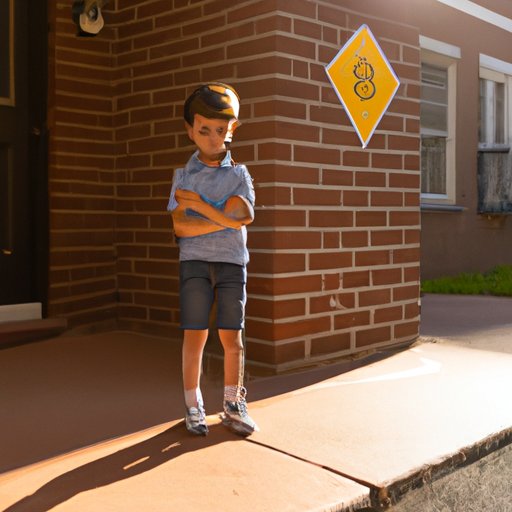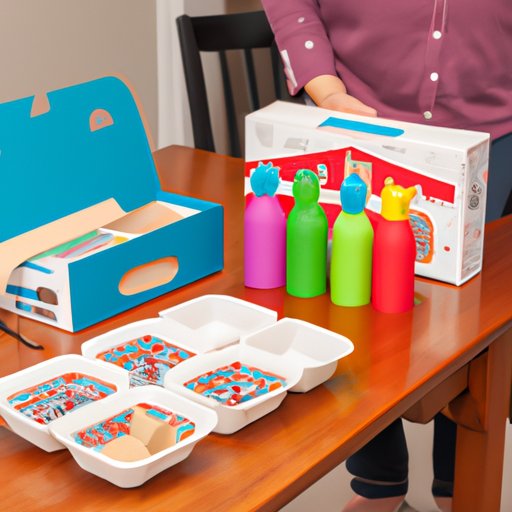
Introduction
Leaving your child home alone for the first time can be nerve-wracking for any parent. While some children may be mature enough to handle the responsibility, others may not be ready. But what is the right age to leave a child home alone? In this article, we explore the legal age to leave kids home alone, factors to consider when making this decision, how to prepare your child, and common misconceptions surrounding this topic.
Legal Age to Leave Kids Home Alone
The legal age to leave kids home alone varies across states and countries. In most US states, there is no legal age, and the decision is left up to the discretion of the parent or caregiver. However, some states have guidelines that suggest children should be at least 12 years old before staying home alone. In Canada and the UK, the legal age is typically around 12 or 13 years old.
Several factors can influence the legal age to leave kids home alone, including the child’s maturity level, family dynamics, and neighborhood safety. Additionally, parents who leave their children home alone may face legal implications if something goes wrong. It is crucial to understand the laws in your state or country before making this decision.
Factors to Consider When Deciding What Age to Leave Kids Home Alone
Before deciding what age to leave a child home alone, there are several factors that parents must consider, such as the child’s age and maturity level, family dynamics, neighborhood safety, and potential risks and hazards in the home.
A child’s age and maturity level are perhaps the most critical factors in deciding whether they are ready to stay home alone. While age is not always an accurate indicator of maturity, parents should consider the child’s ability to follow instructions, handle emergencies, and make safe decisions.
Family dynamics and situation also play a crucial role. Parents must consider how frequently they need to leave their child alone, the duration of their absence, and the overall family support system.
Neighborhood safety is another crucial factor. Parents should evaluate their neighborhood’s safety and assess the risks of leaving their child alone, especially if they live in an unsafe part of town.
Finally, parents should evaluate potential risks and hazards in the home. For example, sharp objects, poisonous substances, and electrical hazards may pose a danger to young children. Parents should also consider their child’s temperament and behavior and how they might react to being alone.

Preparing Your Child to Stay Home Alone
Before leaving their child home alone, parents should have a plan in place to ensure their safety and well-being. Parents must educate their children on safety rules and precautions, such as not opening the door for strangers and not using the stove or oven without supervision. Communication is also essential, and parents should establish emergency plans and protocols for their child to follow.
Practice runs and trial periods are critical to ensure your child understands the rules and can handle the responsibility. During trial runs, parents should monitor their child’s behavior and readiness closely. Parents should also continue to supervise and check in on their child during this period.
What to Do if Your Child is Too Young to Stay Home Alone
If a child is too young to stay home alone, parents have other alternatives to consider, such as babysitters, community center programs, or family and friends’ help. While these options may be inconvenient or costly, they are vital to ensuring a child’s safety.
Leaving children unattended can pose significant risks, including injuries, accidents, and more severe consequences such as neglect or abuse. Parents must consider the benefits and risks of each option before making any decisions.
Advantages and Disadvantages of Kids Staying Home Alone
There are pros and cons to leaving children home alone. On the positive side, staying home alone can promote independence, responsibility, and self-sufficiency. Children can learn valuable life skills and develop their problem-solving and decision-making abilities.
On the flip side, children may feel scared, lonely, or overwhelmed when left home alone. Risks, such as accidents and injuries, may also increase when children are unsupervised. Each child’s individual circumstances must be taken into account when evaluating the benefits and drawbacks of staying home alone.
How to Help a Child Who is Afraid to Be Home Alone
Many children may feel anxious or scared when left home alone, even when they have been prepared adequately. Parents can help calm their child’s fears by discussing their concerns and reassuring them that they are safe. Practicing relaxation techniques, such as deep breathing or visualization, can also help alleviate anxiety and nervousness.
Professional help and resources, such as therapists or support groups, can also be beneficial to children who struggle with fear and anxiety.
Common Misconceptions About Leaving Kids Home Alone
Several myths and misconceptions surround leaving kids home alone. One common myth is that children who stay home alone are more likely to become delinquent or get into trouble. Research, however, has not found any evidence to support this claim.
Another misconception is that there is a specific age when children are “ready” to stay home alone. Maturity, life experience, and family support are more critical indicators of a child’s readiness than age.
Parents must evaluate their unique situation and make individualized, informed decisions based on their child’s maturity level, safety guidelines, and individual circumstances.
Conclusion
Leaving kids home alone is a significant decision for all parents. The legal age to leave children alone varies across states and countries, and parents must consider several factors, such as their child’s maturity level, family dynamics, and neighborhood safety. Preparing your child beforehand with safety rules and emergency protocols, as well as monitoring their progress, is crucial to ensure their well-being.
While the decision to leave children unsupervised is a personal one, parents must make informed decisions based on their child’s maturity and individual circumstances. Seeking guidance, support, and resources can also be helpful in making this decision.




